-

新人教版高中英语必修3Unit 4 Space Exploration-Reading and Thinking教学设计二
The theme of this unit focuses on “space exploration.” Students will learn about the training and experience needed to become an astronaut. The text is mainly about the development of space exploration. On the one hand, the text helps students to have a good understanding about the great feats humans have achieved, on the other hand, they will further understand the contributions that we Chinese have achieved, and feel confident and proud about our homeland and strengthen their love for our country. The teacher should instruct students to aim high and study harder to make great progress in the space career if possible.1. Read about the development and value of space exploration.2. Explore the mysteries of the universe and the achievements in space exploration.3. Skillfully use the vocabulary of this text to cultivate self-study ability 4. Develop cooperative learning ability through discussion.1. Enable the Ss to talk about the development and value of space exploration.2. Guide the Ss to summarize the main idea of each paragraph as well as the main idea of the text.3. Help Ss comprehend the main reasons for space exploration. Multi-media, textbook, notebooks.Step 1: Warming up and predictionLook at the title and the pictures of the text and predict what the text will be about?2. What are the main reasons for space exploration?

新人教版高中英语必修3Unit 1 Festivals and Celebrations-Reading for writing教学设计二
Step 3 Analyzing article structureActivity 31. Teachers raise questions to guide students to analyze the chapter structure of this diary and think about how to describe the festival experience. (1)What should be included in the opening/body/closing paragraph(s)?(2)How did the writer arrange his/her ideas?(3)What kind of interesting details did the writer describe?(4)How did the writer describe his/her feelings/emotions during the event?2. Students read and compare the three sentence patterns in activity 2. Try to rewrite the first paragraph of the diary with these three sentence patterns. After that, students exchange corrections with their partners. Such as:●This was my first time spending three days experiencing the Naadam Festival in China’s Inner Mongolia Autonomous Region and it was an enjoyable and exciting experience. ●I'll never forget my experience at the Naadam Festival because it was my first time to watch the exciting Mongolian games of horse racing, wrestling, and archery so closely. ●I'll always remember my first experience at the Naadam Festival in China’s Inner Mongolia Autonomous Region because it was so amazing to spend three days witnessing a grand Mongolian ceremony. Step 4 Accumulation of statementsActivity 41. Ask the students to read the diary again. Look for sentences that express feelings and emotions, especially those with the -ing form and the past participle. Such as:● …horse racing, wrestling, and archery, which are all so exciting to watch. ● some amazing performances● I was surprised to see…● I was a little worried about. . . ● feeling really tiredOther emotional statements:●I absolutely enjoyed the archery, too, but the horse races were my favourite part. ●I'm finally back home now, feeling really tired, but celebrating Naadam with my friend was totally worth it. ●He invited me back for the winter to stay in a traditional Mongolian tent and cat hot pot. I can’t wait!2. In addition to the use of the -ing form and the past participle, the teacher should guide the students in the appreciation of these statements, ask them to memorize them, and encourage them to use them reasonably in writing practice.

新人教版高中英语必修3Unit 4 Space Exploration-Reading for Writing教学设计二
⑦在我看来, 探索太空是值得的。As far as I am concerned, it is worthwhile to explore the space.Step 10 Writing---draftRecently, students in our class have had heated a discussion on whether space is worth exploring. Students hold different ideas about it.30% of us think space exploration is not worthwhile. They think space is too far away from us and our daily life and is a waste of money. And the money spent on space exploration can be used to solve the earth’s problems such as starvation and pollution.On the other hand,70% think space is worth exploring because we have benefited a lot from it,such as using satellites for communication and weather forecast. What’s more,with further space research,we may solve the population problem by moving to other planets one day. Also,space research will enable us to find new sources to solve the problem of energy shortages on the earth.As far as I am concerned, it is worthwhile to explore the space. Not only can it promote the development of society but also enrich our life. Step 11 Pair workExchange drafts with a partner. Use this checklist to help your partner revise his/her draft.1.Does the writer explain why he/she changed/wanted to change?2.Does the writer tell how the changes have improved or will improve his/her life?3.Is the text well-organised?4.Does the writer use words and expressions to show similarities and differences?5.Are there any grammar or spelling errors?6.Does the writer use correct punctuation?

新人教版高中英语必修3Unit 5 The value of money-Reading and Thinking教学设计二
? Could you offer me some kind of work here?? I don’t want your charity, I just want an honest job.? Careless: I landed in Britain by accident.Step 7:Consolidation.? Find Henry? Roderick and Oliver were I .making a bet when they saw Henry, a poor young man. ? Know Henry? About a month ago, Henry was sailing and later he found himself carried out to sea by a strong wind. Fortunately, he 2.was spotted by a ship. And it was the ship that brought him to 3.England? Offer money to Henry ? Oliver and Roderick gave Henry a letter and told him that there was money in it. They 4.persuaded him to accept it, and made him 5.promise that it wouldn't be opened until 2 o'clock.Step 8:Language pointsa large amount of: a large quantity of; a great deal ofe.g. They bought a large amount of furniture before they moved their new house.make a bet: make an arrangement to risk money, etc. on an event of which the result is doubtful.e.g. We made a bet on the result of the match.permit sb to do something: allow somebody to do somethinge.g. My mother doesn’t permit me to ride in the street after it rained.by accident: as a result of chancee.g. I only found it by accident.stare at: look at somebody or something with the eyes wide open in a fixed gaze( in astonishment, wonder, fear, etc)to be honest: to tell you the truth; to be franke.g. To be honest, I don’t think we have a chance of winning.Step7 Homework:What do you think will happen to Henry? Will the bank-note help him or get him into trouble?

新人教版高中英语必修3Unit 5 The Value of Money-Reading for Writing教学设计二
2. 您能看到, 我头发太长了。You can see that my hair is much too long.3. 无论什么时候, 只要您想回来就回来。Please come back whenever you want.4. 您仅有很少的头发要理! You only have too little hair to cut !5. 为您服务是我的荣幸!It is my honour to serve you!Step 9 Writing(Henry is walking down the street when he sees a sign for a place that cuts hair. He decides to have it cut. )H=Henry B=BarberH: Good afternoon, I’d like to have my hair cut, if I may. (The barber looks at Henry’s hair and continues cutting another man’s hair. ) Er, I’d really like a haircut. As you can see it’s much too long. B: (in a rude manner) Yes, I can see that. Indeed, I can. H: Fine, well, I’ll have a seat then. (He sits in one of the barber’s chairs. The barber turns to look at Henry. )B: It’s quite expensive here, you know! Are you sure you can afford it?H: Yes. I think so. (After his hair is cut, the barber tells Henry how much he must pay. Henry shows the barber the bank note. )B: Why Mr. . . (looks shocked)H: Adams. Henry Adams. I’m sorry. I don’t have any change. B: Please don’t worry! (wearing a big smile) Nothing to worry about! Nothing at all! Please come back whenever you want, even if you only have too little hair to cut! It will be my honour to serve you!Step 10 Pair workExchange drafts with a partner. Use this checklist to help your partner revise his/her draft.1. Are all the elements of a play included and in good order ?2. Do the character use suitable language ?3. Are the stage directions clear and useful ?4. Is the plot clear and exciting enough ?
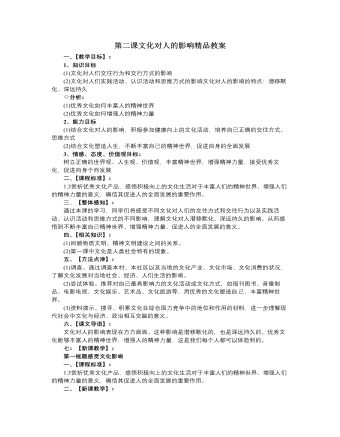
人教版高中政治必修3第二课文化对人的影响精品教案
民族精神是一个民族赖以生存和发展的精神支撑。一个民族,没有振奋的精神和高尚的品格,不可能自立于世界民族之林。“铁人”精神是“爱国、创业、求实、奉献”的大庆精神的典型化、人格化。其主要方面包括:“为祖国分忧、为民族争气”的爱国主义精神;为“早日把中国石油落后的帽子甩到太平洋里去”,“宁肯少活二十年,拼命也要拿下大油田”的忘我拼搏精神;干事业“有条件要上,没有条件创造条件也要上”的艰苦奋斗精神;“要为油田负责一辈子”,“干工作要经得起子孙万代检查”,对工作精益求精,为革命“练一身硬功夫、真本事”的科学求实精神;不计名利,不计报酬,埋头苦干的“老黄牛”精神;等等。40多年来,“铁人”精神早已家喻户晓,深入人心,成为大庆人的共同理想、信念和行为准则。“铁人”精神是对王进喜崇高思想、优秀品德的高度概括,体现了我国工人阶级精神风貌和中华民族传统美德的完美结合。“铁人”精神是战胜困难、勇往直前、不断取得新胜利的巨大精神力量。“铁人”精神是我们强大的精神支柱。
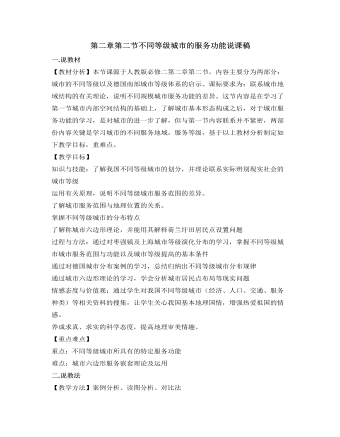
人教版高中地理必修2第二章第二节不同等级城市的服务功能说课稿
【教学目标】知识与技能:了解我国不同等级城市的划分,并理论联系实际辨别现实社会的城市等级运用有关原理,说明不同等级城市服务范围的差异。了解城市服务范围与地理位置的关系。掌握不同等级城市的分布特点了解称城市六边形理论,并能用其解释荷兰圩田居民点设置问题过程与方法:通过对枣强镇及上海城市等级演化分布的学习,掌握不同等级城市城市服务范围与功能以及城市等级提高的基本条件通过对德国城市分布案例的学习,总结归纳出不同等级城市分布规律通过城市六边形理论的学习,学会分析城市居民点布局等现实问题情感态度与价值观:通过学生对我国不同等级城市(经济、人口、交通、服务种类)等相关资料的搜集,让学生关心我国基本地理国情,增强热爱祖国的情感。养成求真、求实的科学态度,提高地理审美情趣。
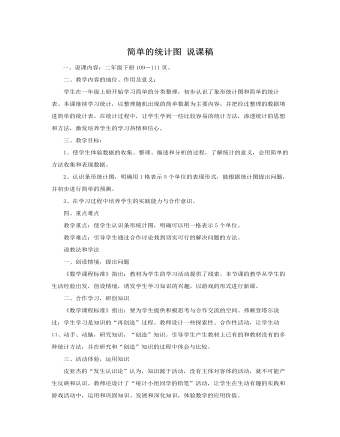
人教版新课标小学数学二年级下册简单的统计图说课稿
学生在一年级上册开始学习简单的分类整理,初步认识了象形统计图和简单的统计表。本课继续学习统计,以整理随机出现的简单数据为主要内容,并把经过整理的数据填进简单的统计表。在统计过程中,让学生学到一些比较容易的统计方法,渗透统计的思想和方法,激发培养学生的学习热情和信心。三、教学目标:1、使学生体验数据的收集、整理、描述和分析的过程,了解统计的意义,会用简单的方法收集和表现数据。2、认识条形统计图,明确用1格表示5个单位的表现形式,能根据统计图提出问题,并初步进行简单的预测。3、在学习过程中培养学生的实践能力与合作意识。四、重点难点教学重点:使学生认识条形统计图,明确可以用一格表示5个单位。教学难点:引导学生通过合作讨论找到切实可行的解决问题的方法。
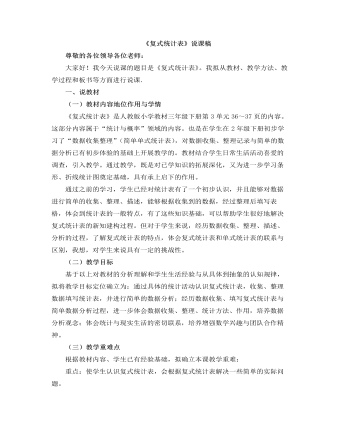
小学数学人教版三年级下册《复式统计表》说课稿
一、说教材(一)教材内容地位作用与学情《复式统计表》是人教版小学教材三年级下册第3单元36~37页的内容。这部分内容属于“统计与概率”领域的内容。也是在学生在2年级下册初步学习了“数据收集整理”(简单单式统计表),对数据收集、整理记录与简单的数据分析已有初步体验的基础上开展教学的。教材结合学生日常生活活动喜爱的调查,引入教学。通过教学,既是对已学知识的拓展深化,又为进一步学习条形、折线统计图奠定基础,具有承上启下的作用。通过之前的学习,学生已经对统计表有了一个初步认识,并且能够对数据进行简单的收集、整理、描述,能够根据收集到的数据,经过整理后填写表格,体会到统计表的一般特点,有了这些知识基础,可以帮助学生很好地解决复式统计表的新知建构过程。但对于学生来说,经历数据收集、整理、描述、分析的过程,了解复式统计表的特点,体会复式统计表和单式统计表的联系与区别,我想,对学生来说具有一定的挑战性。
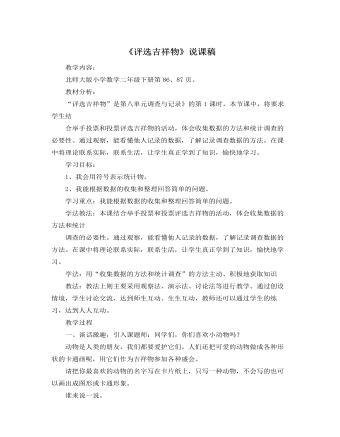
北师大版小学数学二年级下册《评选吉祥物》说课稿
教学过程一、谈话激趣,引入课题师:同学们,你们喜欢小动物吗?动物是人类的朋友,我们都要爱护它们。人们还把可爱的动物做成各种形状的卡通画呢,用它们作为吉祥物参加各种盛会。请把你最喜欢的动物的名字写在卡片纸上,只写一种动物,不会写的也可以画出成图形或卡通形象。谁来说一说。同学们的盛会是六一节,学校准备把同学们最喜欢的动物作为吉祥物布置到校园。该把哪种动物作为吉祥物呢?怎样才知道哪种动物是同学们最喜爱的动物呢?师:对没有调查就没有发言权,调查一下哪种动物最受我们喜欢就行了。用什么方法才能知道喜欢某种动物的人最多呢?请小组讨论下该怎样调查呢?把详细的过程说出来。二、小组合作,探究新知1、说一说,你们组准备怎样开展调查生1:我们让喜欢某种小动物的同学举手。查一查人数就行了。
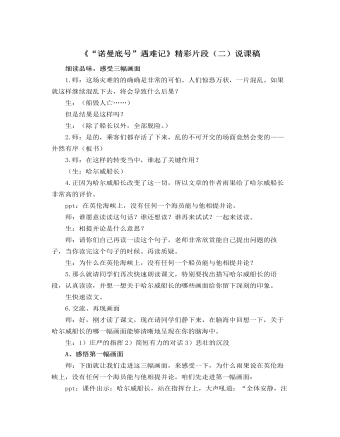
部编人教版四年级下册《 “诺曼底号”遇难记》精彩片段(二)说课稿
师:对,镇定自若。(板书:镇定自若)这份镇定自若,别人能与他相提并论吗?(不能)4.你还能从这段话中读出什么来?妇女先走,船员断后。咱们常说女士优先,在灾难面前也做到让妇女先走,这叫什么?生:绅士风度。(板书:绅士风度)5.同学们,假如你就是哈尔威船长,面对混乱的人群,你准备怎样来下达这道命令?指名学生朗读。(师指导:场面混乱,情况危急。)师:在灾难面前,时间就是生命。师:这是庄严的指挥,这是威严的指挥。我们一起来读读。师:真好,读得好,脸部的表情也非常到位,满脸的威严,正因为这样,所以课文的作者雨果是这样评价船长的,再读。ppt:在英伦海峡上,没有任何一个海员能与他相提并论。(生齐读)师:不能与他相提并论的还有他的:忠于职守、镇定自若、绅士风度。这是咱们从第一幅画面中感受到的。
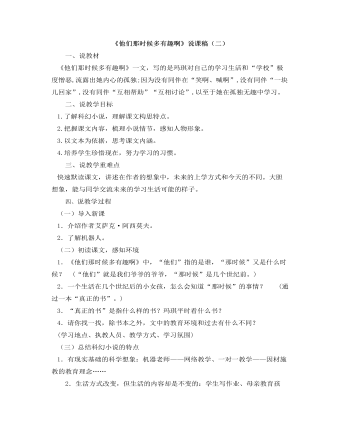
部编人教版六年级下册《他们那时候多有趣啊》说课稿(二)
一、说教材《他们那时候多有趣啊》一文,写的是玛琪对自己的学习生活和“学校”极度憎恶,流露出她内心的孤独;因为没有同伴在“笑啊、喊啊”,没有同伴“一块儿回家”,没有同伴“互相帮助”“互相讨论”,以至于她在孤独无趣中学习。 二、说教学目标1.了解科幻小说,理解课文构思特点。2.把握课文内容,梳理小说情节,感知人物形象。3.以文本为依据,思考课文内涵。4.培养学生珍惜现在,努力学习的习惯。 三、说教学重难点快速默读课文,讲述在作者的想象中,未来的上学方式和今天的不同。大胆想象,能与同学交流未来的学习生活可能的样子。 四、说教学过程(一)导入新课1.介绍作者艾萨克·阿西莫夫。2.了解机器人。(二)初读课文,感知环境1.《他们那时候多有趣啊》中,“他们”指的是谁,“那时候”又是什么时候? (“他们”就是我们爷爷的爷爷,“那时候”是几个世纪前。)
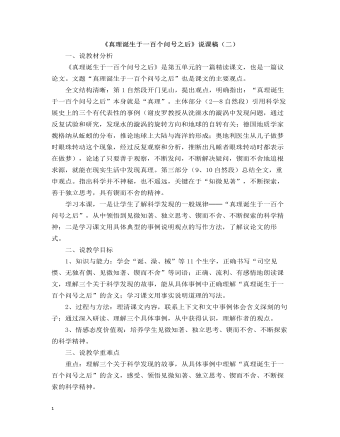
部编人教版六年级下册《真理诞生于一百个问号之后》说课稿(二)
一、说教材分析《真理诞生于一百个问号之后》是第五单元的一篇精读课文,也是一篇议论文。文题“真理诞生于一百个问号之后”也是课文的主要观点。全文结构清晰:第1自然段开门见山,提出观点,明确指出:“真理诞生于一百个问号之后”本身就是“真理”。主体部分(2—8自然段)引用科学发展史上的三个有代表性的事例(谢皮罗教授从洗澡水的漩涡中发现问题,通过反复试验和研究,发现水的漩涡的旋转方向和地球的自转有关;德国地质学家魏格纳从蚯蚓的分布,推论地球上大陆与海洋的形成;奥地利医生从儿子做梦时眼珠转动这个现象,经过反复观察和分析,推断出凡睡者眼珠转动时都表示在做梦),论述了只要善于观察,不断发问,不断解决疑问,锲而不舍地追根求源,就能在现实生活中发现真理。第三部分(9、10自然段)总结全文,重申观点。指出科学并不神秘,也不遥远,关键在于“知微见著”,不断探索,善于独立思考,具有锲而不舍的精神。
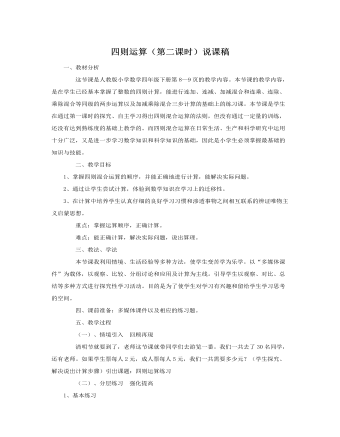
人教版新课标小学数学四年级下册四则运算(第二课时)说课稿
1、自主检测现在我们要开始攀登主峰了,道路是崎岖的,我相信同学们能够克服重重困难登顶成功,只要细心,你就能行。学生独立完成习题。2、评价完善一生汇报答案,其余自我核对,矫正错误。(四)、归纳小结 课外延伸1、归纳小结这节课我们主要学习了什么内容?你最大的收获是什么?你觉得自己的表现怎么样?教师适时的对学生的学习情况作以情感性和知识性评价。2、课外延伸课本第九页思考练习。(设计意图:让学生总结所学,在交流反思中,意识到学习方式的重要性和数学内容的延续性,激发学生进一步探究知识的欲望。让学生把这节课的收获和尚存在的疑问告诉小组的同伴,针对学生疑问采用生生交流,师生交流的形式给予解决,这样不但使问题得以解决,还培养了学生的团队协助精神。)
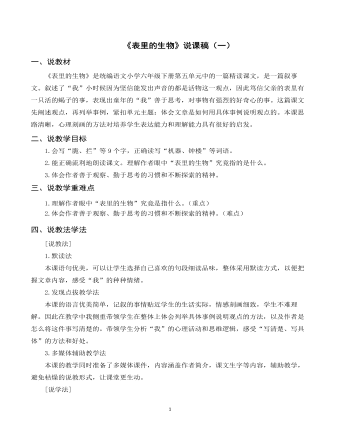
部编人教版六年级下册《表里的生物》说课稿(一)
一、说教材《表里的生物》是统编语文小学六年级下册第五单元中的一篇精读课文,是一篇叙事文。叙述了“我”小时候因为坚信能发出声音的都是活物这一观点,因此笃信父亲的表里有一只活的蝎子的事,表现出童年的“我”善于思考,对事物有强烈的好奇心的事。这篇课文先阐述观点,再列举事例,紧扣单元主题:体会文章是如何用具体事例说明观点的。本课思路清晰,心理刻画的方法对培养学生表达能力和理解能力具有很好的启发。二、说教学目标1.会写“脆、拦”等9个字,正确读写“机器、钟楼”等词语。 2.能正确流利地朗读课文。理解作者眼中“表里的生物”究竟指的是什么。 3.体会作者善于观察、勤于思考的习惯和不断探索的精神。三、说教学重难点1.理解作者眼中“表里的生物”究竟是指什么。(重点)2.体会作者善于观察、勤于思考的习惯和不断探索的精神。(难点)
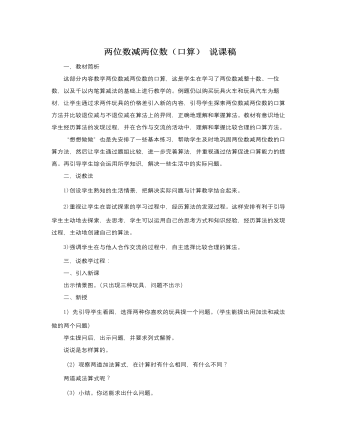
人教版新课标小学数学二年级下册两位数减两位数(口算)说课稿
这部分内容教学两位数减两位数的口算,这是学生在学习了两位数减整十数、一位数,以及千以内笔算减法的基础上进行教学的。例题仍以购买玩具火车和玩具汽车为题材,让学生通过求两件玩具的价格差引入新的内容,引导学生探索两位数减两位数的口算方法并比较退位减与不退位减在算法上的异同,正确地理解和掌握算法。教材有意识地让学生经历算法的发现过程,并在合作与交流的活动中,理解和掌握比较合理的口算方法。“想想做做”也是先安排了一些基本练习,帮助学生及时地巩固两位数减两位数的口算方法,然后让学生通过题组比较,进一步完善算法,并重视通过估算促进口算能力的提高。再引导学生综合运用所学知识,解决一些生活中的实际问题。二,说教法1)创设学生熟知的生活情景,把解决实际问题与计算教学结合起来。2)重视让学生在尝试探索的学习过程中,经历算法的发现过程。
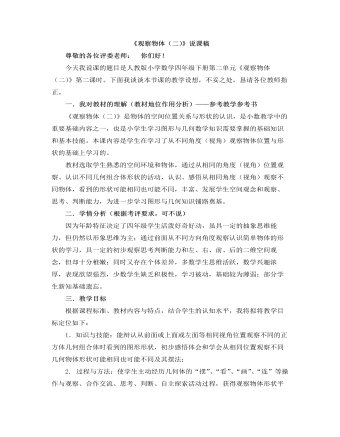
小学数学人教版四年级下册《观察物体(二)》说课稿
一.我对教材的理解(教材地位作用分析)——参考教学参考书《观察物体(二)》是物体的空间位置关系与形状的认识,是小数教学中的重要基础内容之一,也是小学生学习图形与几何数学知识需要掌握的基础知识和基本技能。本课内容是学生在学习了从不同角度(视角)观察物体位置与形状的基础上学习的。教材选取学生熟悉的空间环境和物体,通过从相同的角度(视角)位置观察、认识不同几何组合体形状的活动,认识、感悟从相同角度(视角)观察不同物体,看到的形状可能相同也可能不同,丰富、发展学生空间观念和观察、思考、判断能力,为进一步学习图形与几何知识铺路奠基。二.学情分析(根据考评要求,可不说)因为年龄特征决定了四年级学生活泼好奇好动,虽具一定的抽象思维能力,但仍然以形象思维为主;通过前面从不同方向角度观察认识简单物体的形状的学习,具一定的初步观察思考判断能力和左、右、前、后的二维空间观念,但却十分稚嫩;同时又存在个体差异,多数学生思维活跃,数学兴趣浓厚,表现欲望强烈,少数学生缺乏积极性,学习被动,基础较为薄弱;部分学生新知基础遗忘。
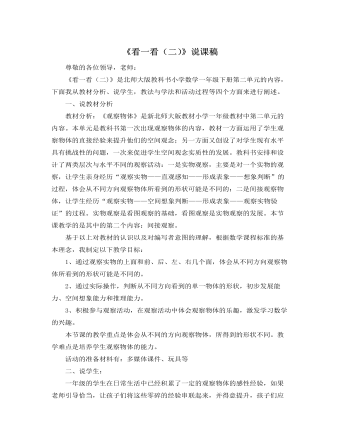
北师大版小学数学一年级下册《看一看(二)》说课稿
这样的设计是因为低年级的学生比较喜欢听故事,充分调到他们的积极性,使之不感觉乏味。最后是回顾小结,总结收获。首先让学生说说本节课有哪些地方需要提醒同学们注意。。然后,教师进行恰当评价。此环节通过师生互动、生生互动,经历一次再学习、再巩固的过程。这节课中,我有浅入深,让学生体会到数学与现实生活的密切联系,让学生能够实实在在的从课堂学习中获取新知,建立数学模型,培养能力,发展思维,从而喜欢数学课,热爱数学学科。整堂课教学设计结构严谨、条理清楚、层层深入。既重视了知识本身的建构,又重视了课堂结构的建构,充分体现了学生从“问题情境—建立数学模型—解释、应用与拓展”的意义建构的学习过程。学习无止境,在今后的教学中,我会更加努力地钻研教材、设计教法,力争使每一节数学课都能达到理想的教学效果。
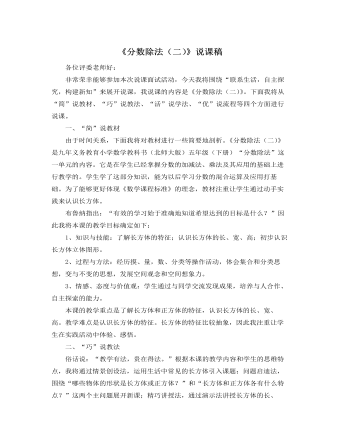
北师大版小学数学五年级下册《分数除法(二)》说课稿
1、知识与技能:了解长方体的特征;认识长方体的长、宽、高;初步认识长方体立体图形。2、过程与方法:经历摸、量,数、分类等操作活动,体会集合和分类思想,变与不变的思想,发展空间观念和空间想象力。3、情感、态度与价值观:学生通过与同学交流发现成果,培养与人合作、自主探索的能力。本课的教学重点是了解长方体和正方体的特征,认识长方体的长、宽、高。教学难点是认识长方体的特征。长方体的特征比较抽象,因此我注重让学生在实践活动中体验、感悟。二、“巧”说教法俗话说:“教学有法,贵在得法。”根据本课的教学内容和学生的思维特点,我将通过情景创设法,运用生活中常见的长方体引入课题;问题启迪法,围绕“哪些物体的形状是长方体或正方体?”和“长方体和正方体各有什么特点?”
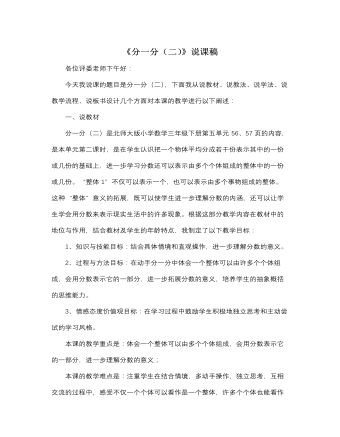
北师大版小学数学三年级下册《分一分(二)》说课稿
本环节我依据教学目标和学生对知识的掌握情况,我设计了有针对性、层次分明的练习题(基本题、变式题、拓展题),让学生在解决这些问题的过程中,进一步理解,巩固新知,训练思维的灵活性,使学生的探索精神和实践能力得到进一步的提高。[本环节的设计意图:通过多层次的练习,激发学生的学习兴趣,调动学生学习的积极性和主动性,使学生获得愉悦的情感体验。同时使学生的知识结构更加完善。]第四环节:课堂小结在轻松愉快的学习活动结束后,我会与学生进行总结对话“这节课你有什么收获?你学会了什么?还有什么不懂得地方吗?”学生充分发言,交流自己的学习心得。[本环节的设计意图:帮助学生梳理知识,整理本课的知识要点,完成本节课的教学活动。]